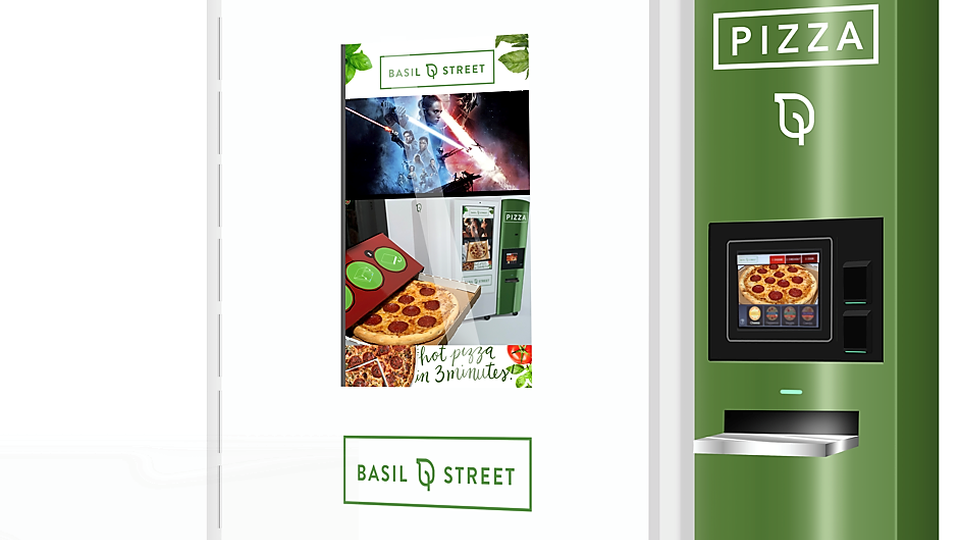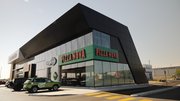Article
Pandemic piques 'interest in 'brick-oven-style' pizza vending machines
Can you really get a pizza that tastes like it was fired in a brick oven from a high-tech vending machine? Basil Street Cafe thinks so, as it prepares to roll out its Automated Pizza Kitchens nationally.

April 15, 2020 by S.A. Whitehead — Food Editor, Net World Media Group
When asked how his company's pizza vending machine is different from others — like those Pizza Marketplace has covered — the CEO of Basil Street Café, Deglin Kenealy, turns to the lowly Brussel sprout to explain.
"We view the process like Brussel sprouts," Kenealy said in an interview with Pizza Marketplace. He said the company likes to ask potential customers if they like the bite-sized cabbage-shaped vegetables.
"The answer we often hear is, 'Yes, we love roasted Brussel sprouts with some olive oil, salt,and pepper, maybe some pancetta.' But (then the company asks), 'Do you like boiled brussel sprouts that are kind of soft and mushy?' Most people say no."
He said the point is that the way you cook foods can be a key differentiator. The company's pizza vending machine — known as the Automated Pizza Kitchen or APK — is what Kenealy said make all the difference in the finished product.
 |
| Basil Street Cafe CEO Deglin Kenealy (photo provided). |
"Our proprietary technology allows us to cook each type of pizza as it should be cooked. A pizza with tomatoes on top must be cooked differently than a plain cheese pizza, which should also be cooked differently than a pepperoni pizza. Our oven technology changes the cooking profile used for each pizza based on the type of pizza, starting temperature of the oven, the altitude of the APK (for automated pizza kitchen) and other factors."
In fact, these units, which will soon dot the landscape in various regions of the country, use leading-edge robotics and learning technology to fine-tune the pizza production process for better output at each location. A central command post monitors each machine in real time.
Kenealy said the process is so akin to that of a traditional pizzeria oven-fired pie, he actually calls it a brick-oven pizza experience, though he admits no brick-oven is actually involved.
Pandemic fuels interest in 'touchless' pizza production
This March, Basil Street closed a $10 million priced round of funding, which initially was being used to roll out the first machines nationally in April. But the many challenges posed by COVID-19 have pushed that back, "about a month or so," Kenealy said.
But on the brighter side, Kenealy said the pandemic and its many related business restrictions have actually ended up accelerating demand for the machines nationally.
"Because our process minimizes touchpoints, decision-makers within these locations have identified our APK as a wonderful option," Kenealy relayed, adding that mutual non-disclosure agreements prevent him from naming the locations until units are up and running.
Nonetheless, he did explain that initial deployments of the 20-square-foot pizza-producing units are planned for military bases, factories, corporate facilities and hospitals in Southern California, Las Vegas, North Carolina, and Texas. And in each location, nearby pizza restaurateurs can expect the units to provide a source of competition that some consumers might deem more expedient, convenient, and — if Kenealy is correct about the flavor of the product — possibly even equally tasty as what their brands are creating.
"When we researched past and current (pizza vending machine) solutions, we found they utilized some form of microwave or other historical heating source in a standalone or combination format," Kenealy said. "Our research and our team of speed-oven specialists decided that a different path was appropriate for a myriad of health, safety, quality, consistency, cost and sustainability reasons … The result of our development effort is a robust, unique oven that produces a delicious pizza with a finish and bite similar to one fresh from a brick-oven or wood-burning pizza oven."
He said because the brand is only partially finished with patent process nationally and worldwide, he could not elaborate more on the intricacies of the cooking process. But he said aside from the oven itself, the recipes and fresh ingredients are also key to quality of the pies created in the APK.
He said the "Italian-style" crust the Basil Street Café culinary team created forms a base with a brick-oven flavor and texture. These first-round units produce a selection of pepperoni, four-cheese or a rotating monthly special pie, like vegetarian or dessert pizzas.
More elaborate Round 2 APKs en route
"We are already working on our second-generation units that will allow for more pizza choices, as well as the option to order remotely and pick up your pizza," he said.
Each unit has an internally housed mechanism to monitor more than 30 operational areas, including inventories of supplies, sanitization intervals and output for the pies that start under $10 each and are prepared and baked in approximately three minutes.
Though the initial rollouts will all be at sites investors and others Basil Street insiders have suggested or recommended, he believes the biggest acceleration in machine placement will occur after the first machines are up, running and generating further interest about placements at other locations.
"We believe hospitals will significantly benefit from being able to feed hungry doctors, nurses, and other staff as well as family members who are concerned about their loved ones," Kenealy said, by way of example of potential sites for future machine placement. Currently, the units are all placed in locations selected by Basil Street Café leadership, rather than being provided to other entities for placement and operation.
But the APKs have got some real output perks on their sides, with each unit capable of producing 150 10-inch pizzas to feed up to 300 people before requiring additional stocking. Kenealy said the modest amount of publicity the company has received thus far, as well as that which will occur during the full rollout in a month or so, is expected to fuel even more interest than that brought on by the many business constraints of COVID-19.
"COVID-19 has created additional positive energy for our units," he said. "People are beginning to realize that a high-volume, retail food solution like our APK can feed a large number of people with significantly less risk of food- or human-borne illness."
The pies used in the machines are created in what Kenealy called "an environmentally controlled facility" with stringent sanitation requirements that require all workers to don gloves, white coats, hairnets, and eye protection.
He said pizzas created there are packed and frozen to 0 degrees until they are moved to the oven inside the units, which bake them at 500 degrees. As a result they are essentially "touchless" from prep to customer. Smartphone ordering through the machine is, according to Kenealy, "a few months out."
"COVID-19 has increased the demand," Kenealy said. "We are looking at volume manufacturing options to meet that increased demand."
See other COVID-19 pandemic coverage on Pizza Marketplace here.
About S.A. Whitehead
Pizza Marketplace and QSRweb editor Shelly Whitehead is a former newspaper and TV reporter with an affinity for telling stories about the people and innovative thinking behind great brands.









